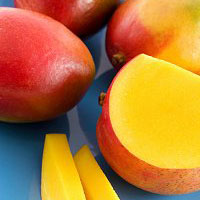Mango comes from Asia and belongs to the genus Mangifera, this tropical fruit grows on all continents, including North America. This exotic fruit is called king of the fruits or “food of the gods” by the Indians, is an excellent source of carotene. A medium sized mango can give us up to 15,000 units of vitamin A, enough for about seven days.
Nutrients are present in large amounts: carbohydrates, lipids, protein, fiber, potassium, sodium, phosphorus, calcium and iron. Other important substances are Omega-3 and Omega-6. Antioxidants are represented by carotenoids that can counteract free radicals, including beta-carotene which give the yellow-orange color of the fruit.
Mango fruit health benefits:
Mango has many health benefits: lowers cholesterol, strengthens the cardiovascular system, reduces vascular fragility and increases the vessels resistance, is a potent antioxidant and strengthen the immune system, reduces the risk of cancer, mobilizes fat, is detoxifying, helps in getting rid of stress.
Prevents nervous fatigue:
The contained enzymes act on the central nervous system with protective effect on nerves in patients suffering from hysteria or insomnia and improves memory.
Decrease blood pressure and prevents cancer:
Prevents colon cancer in particular, because of a special substance found in mango, which has proven anti-inflammatory properties, antioxidant agents and protection against viruses.
Good for weight loss:
Mango contains enzymes that will help people to lose weight. The fruit has a laxative, diuretic effect, improves digestion and thyroid function.
Other indications:
It is a great energizer and aphrodisiac. A cup of mango juice contains 3g of fiber, 3mg potassium, 1g protein, 12% of vitamin E and 17% of vitamin B6.
In herbal medicine, from the leaves of mango is prepared an infusion useful for treating diarrhea and diabetes, and the seeds, with a decoction, are used in case of infection with trichomonas vaginalis or bleeding.
Precautions:
Because the carbohydrate content, mango should be consumed with caution by diabetics. The fruit skin contains substances with average toxicity levels that can cause side effects or lead to poisoning in children who accidentally ingest it.
